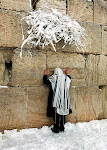15 Elul 5768
Sorry for the delay, had a busy weekend.
Okay, so we know how the Yetzer Hara attacks us - with כפירה, גאוה, and תאוה. How do we fight him? How do we defend ourselves against these three weapons?
I'm not going to tell you anything new, just that Jews have been fighting the Yetzer Hara with these defenses since the beginning of creation. So don't feel afraid or alone when you battle - you're part of a greater whole, a greater כלל.
The way to fight כפירה is, not surprisingly, to learn Torah. If you know the halachos cold, there's less of a chance the Yetzer Hara will be able to say, "Come on, that's not really assur." You'll be able to say back, "No! It
is assur! I learned it last week, I
know the halachos." There's a smaller window for the Yetzer Hara to pull shtick, because you
know what the issur/mitzvah is and you
know the punishment or reward.
The way to fight גאוה and תאוה is to learn mussar, to work on our middos. Now, this doesn't mean that you should just read Mesillas Yesharim and you'll be fine. Don't get me wrong, that's great, but "learning mussar" means a lot more than that. It means sitting down, thinking about what you need to work on, and
working on it. Let's discuss how to do this.
First off, choose two things that you want to work on. Not more, you will lose focus that way. They should be specific, not general. For example, don't choose "I want to daven Shemoneh Esrei better." Choose "I want to work on מודים." The reason for this is twofold: One, you'll be more alerted to a focused goal than on a broader one. Second, and more important, it's much easier for the Yezter Hara to stop us from performing a broad goal than it is for him to stop a short, quick goal. If your goal is Shemoneh Esrei, it's easier for the Yezter Hara to say, "Eh, breeze through the first few brachos, you'll still concentrate on the last few." But if you're focusing on Modim specifically, then you don't have another option later on - it's a specific goal, right now, without any way of getting around it.
Anyway, pick two middos. Got them? Good. Share them if you want (I'm saying Bircas HaMazon with a bencher and trying to learn Chofetz Chaim 5 minutes before I go to bed). Now, after you've shared them, WRITE THEM DOWN. Make a chart, and check off each time you accomplish your goals. For example, if you're working on מודים, you should have three sections a day, one for each Shemoneh Esrei. Check off when you have extra כונה, and leave it blank when you don't.
Why should you write it down? Because that way the Yetzer Hara can't get you depressed. He can't convince you that you're not succeeding when you really are (he's very good at that, see earlier post titled The Yetzer Hara's trap). When the Yetzer Hara tries to get you to feel down about yourself, you'll be able to point to the sheet and say, "Hey, I'm doing well here!" You'll be able to chart your progress, and
feel good about yourself. That's one of the most important parts to the whole process, because simcha leads to דביקות בהקב"ה.
After two weeks, check out your sheet. Are you succeeding in your goals? Have the middos become second nature to you to the point where you have check marks every single day? If that's the case, great. Pick another middah or two, and start all over again. This is how we can live all our lives in true dedication to perfecting ourselves and our character traits.
May Hashem grant us סייעתא דשמיא and guide us along His path.
Next time, we'll discuss a bit about how we can improve our Tefillos. Until then, הצלחה רבה!
